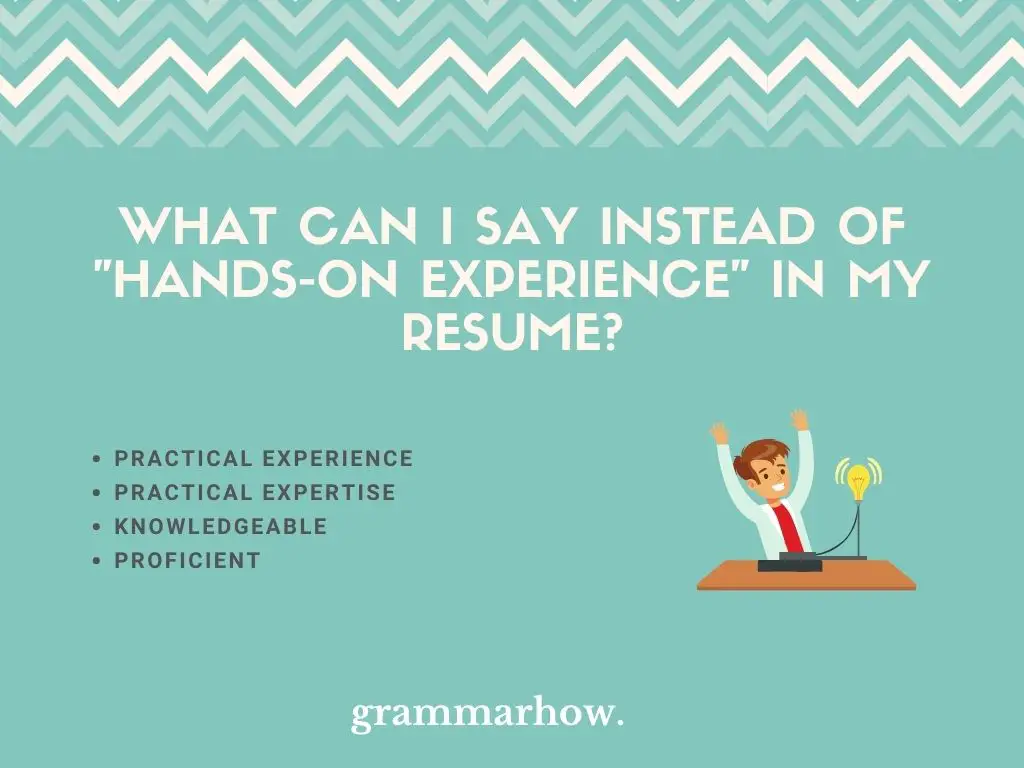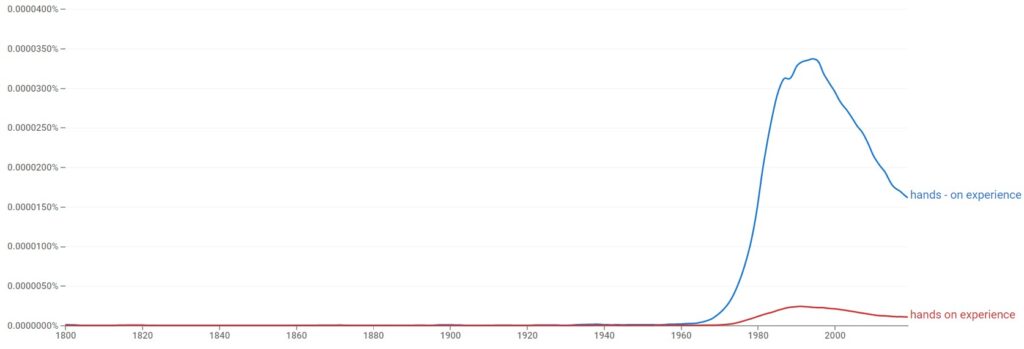“Hands-on experience” is good to include in your resume, but it’s also overused. Some employers want something new and creative, and synonyms for “hands-on experience” are the way to go for that. This article will explore some of the best alternatives for the phrase.
What Can I Say Instead Of “Hands-On Experience” In My Resume?
“Hands-on experience” is a great phrase to use in a resume, and many employers still like to see it. However, if you’re looking for options, you could try one of the following:
- Practical experience
- Practical expertise
- Knowledgeable
- Proficient

The preferred version is “practical experience,” as it has the closest meaning to the original “hands-on experience.” It means that we’ve got physical time spent on whatever equipment or methods we’re talking about in our resume, which is what employers look for.
Practical Experience
We’ll start with “practical experience,” which we believe to be the best alternative. It’s also well-recognized by most employers in CVs and resumes, making it the perfect synonym without further explanation.
“Practical experience” refers to having hands-on experience with specific types of equipment or methods. We can use it to show that we’re able to use something already, without simply having studied it and left it at that.
The definition of “experience,” according to The Cambridge Dictionary, is “the process of getting knowledge or skill from doing, seeing, or feeling things.”
Many employers look for the practical experience because it shows competence and that you’re able to prove that you have the required skills. Some people can have experience with something, but they might have only got that experience through reading a book, which won’t translate well.
With practical experience, you can jump straight in and show them what you can do practically. It’s much more impressive for an employer and usually means they don’t have to worry so much about training you up.
You might see “practical experience” in the following ways on a resume:
- I have practical experience in handling heavy machinery safely.
- I have practical experience with ladders and can train my colleagues up to a safe standard.
- I have practical experience that will benefit me in these situations.
Practical Expertise
“Practical expertise” is a slight step above “practical experience,” though you have to be very bold to claim that you have “expertise” in any area.
“Practical expertise” means that we have the highest level of knowledge or skill in an area or field. “Expertise” means that we have studied long and hard and made sure we know as much as we can about a certain thing. It takes many years to be a true “expert.”
The definition of “expertise,” according to The Cambridge Dictionary, is “a high level of knowledge or skill.”
While “practical expertise” looks great in a resume, you want to make sure you can back it up before you try to use it. It won’t be hard for an employer to test you on your “expertise” to see how well you truly do things, which is why we think it’s best to avoid using over “experience.”
Still, if you’re going to use it, you might write it in the following ways:
- I have practical expertise in most of the technological fields that you work with.
- I have practical expertise that I’m excited to bring to the team and teach them.
- I have practical expertise in modeling and robotics and will happily provide examples of my work.
Knowledgeable
We might be able to use “knowledgeable” in some fields as well. It works well because it’s a simple one-word answer that shows what we’re capable of.
Saying that we’re “knowledgeable” means we know a lot about a certain field. Generally, it doesn’t always refer to “hands-on experience,” but it’s implied that we have the ability to perform well in the field.
The definition of “knowledgeable,” according to The Cambridge Dictionary, is “knowing a lot.”
“Knowledgeable” is a great replacement word, though you can’t always use it correctly in this instance. It does work well when you say you know a lot about certain things, but employers will generally want you to show that you also have the skills to go along with it.
You might see “knowledgeable” in the following ways:
- I am knowledgeable in most of the Adobe Suite and will happily share my expertise with you.
- I am knowledgeable with technology and am able to provide my records.
- I am knowledgeable with writing and will happily provide a portfolio should you need one.
Proficient
Finally, let’s look at “proficient” to see how we might use it in our resume.
“Proficient” is similar to “expertise,” meaning that we have a great deal of knowledge and skill in a particular field or area. We can use it to show that we’re capable of doing things that the employer is looking for.
The definition of “proficient,” according to The Cambridge Dictionary, is “skilled and experienced.”
“Proficient” is a really good adjective to talk about how well we can learn and do things. Sometimes, it might be wise to say that we’re proficient in areas that aren’t related to the job we’re applying to because it shows that we have a vast expanse of general knowledge and capability.
You might see “proficient” used in the following ways:
- I am proficient in Microsoft Office software.
- I am proficient in three languages, which has helped me to travel the world and explore different cultures.
- I am proficient with sport psychology, which I think works really well for this job.
What Does “Hands-On Experience” Mean?
“Hands-on experience” means we have worked “with our hands” to achieve experience in a certain field or area. It usually means that we’ve performed a task in that area rather than simply reading about it or seeing it done by someone else.
The definition of “hands-on experience,” according to The Cambridge Dictionary, is “knowledge or skill that someone gets from doing something rather than just reading about it or seeing it being done.”
“Hands-on experience” is a desirable quality for most candidates because it shows that you know what you’re talking about. It’s easy to read how to do something online or in a book, but it’s another question learning how to do it by getting stuck in with the task.
Examples Of How To Use “Hands-On Experience” In A Sentence
If you’re going to write that you have “hands-on experience” in your resume, some examples might help you understand how it works.
- I have hands-on experience in robotics, and I’d happily provide you with a sample should you ask for one.
- I have hands-on experience in electrical engineering and have developed a safe practice since I was eighteen.
- I have hands-on experience in animal welfare as I was a zookeeper for three years before this.
- I have hands-on experience in electronics as it was something that was required of me in my previous workplace.
- I have hands-on experience in the culinary arts and will happily provide a taster for you if you’d like to take this to the interview stage.
- I have hands-on experience in the entertainment industry, which makes me the ideal candidate for this position.
- I have hands-on experience in the arts, and I’ll provide my portfolio alongside this resume.
“Hands-on experience” talks about something that we’ve developed by doing something and practicing it rather than just reading about it.
If you write about it in your resume, it is good to back it up with evidence to show that you have “hands-on experience” and not just “book knowledge.”
Generally, we can attach documents or portfolios along with our resumes, which is a great way to show how much hands-on experience we have with something.
Should I Use “On” Or “In” With “Hands-On Experience”?
Making sure we use the correct preposition after “hands-on experience” makes or breaks a sentence.
The correct preposition is “in” because we’re talking about having experience “inside” of a field. We do not have experience “on top of” a field, which is why we don’t use “on.”
- Correct: I have hands-on experience in all the required fields.
- Incorrect: I have hands-on experience on these things.
- Correct: I have hands-on experience in everything that is listed below.
- Incorrect: I have hands-on experience on many things, not least of which is technology.
Is It “Hands-On Experience” Or “Hands On Experience?
Some people worry about the hyphen rules, which is why we think it’s important to include a section about it. Hyphens aren’t nearly as scary as you might think, and once you understand them, you’ll be in a better position to use the words.
“Hands-on experience” is correct because “hands-on” is used as an adjective to modify “experience” as a noun. When we use two words as an adjective in this way, we always have to hyphenate them; otherwise, we aren’t following the rules laid out by the AP Stylebook.
According to this graph, “hands-on experience” is by far the most popular choice, and this is owed to it being the grammatically correct one. Of course, “hands on experience” does see some usage, but it’s always due to an error in the writing and should be avoided.

You may also like:
12 Better Ways To Say “Time Management Skills” On A Resume
11 Formal Ways To Say “Tech-Savvy” On Your Resume
10 Better Ways To Say Basic Knowledge On A Resume
Hands on or Hands-on? (Helpful Examples)
11 Good Synonyms For “In Charge Of” On Your Resumé
10 Good Synonyms For “Onboarding” in Business
“Years of Experience” or “Years’ Experience”: Correct Version

Martin holds a Master’s degree in Finance and International Business. He has six years of experience in professional communication with clients, executives, and colleagues. Furthermore, he has teaching experience from Aarhus University. Martin has been featured as an expert in communication and teaching on Forbes and Shopify. Read more about Martin here.
